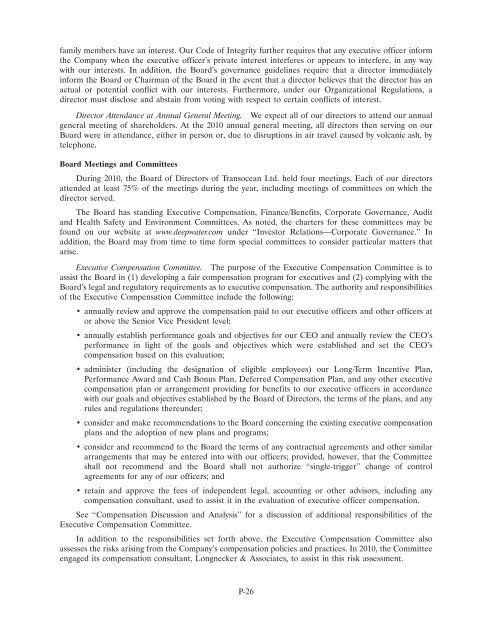Transocean Proxy Statement and 2010 Annual Report
Transocean Proxy Statement and 2010 Annual Report
Transocean Proxy Statement and 2010 Annual Report
You also want an ePaper? Increase the reach of your titles
YUMPU automatically turns print PDFs into web optimized ePapers that Google loves.
family members have an interest. Our Code of Integrity further requires that any executive officer inform<br />
the Company when the executive officer’s private interest interferes or appears to interfere, in any way<br />
with our interests. In addition, the Board’s governance guidelines require that a director immediately<br />
inform the Board or Chairman of the Board in the event that a director believes that the director has an<br />
actual or potential conflict with our interests. Furthermore, under our Organizational Regulations, a<br />
director must disclose <strong>and</strong> abstain from voting with respect to certain conflicts of interest.<br />
Director Attendance at <strong>Annual</strong> General Meeting. We expect all of our directors to attend our annual<br />
general meeting of shareholders. At the <strong>2010</strong> annual general meeting, all directors then serving on our<br />
Board were in attendance, either in person or, due to disruptions in air travel caused by volcanic ash, by<br />
telephone.<br />
Board Meetings <strong>and</strong> Committees<br />
During <strong>2010</strong>, the Board of Directors of <strong>Transocean</strong> Ltd. held four meetings. Each of our directors<br />
attended at least 75% of the meetings during the year, including meetings of committees on which the<br />
director served.<br />
The Board has st<strong>and</strong>ing Executive Compensation, Finance/Benefits, Corporate Governance, Audit<br />
<strong>and</strong> Health Safety <strong>and</strong> Environment Committees. As noted, the charters for these committees may be<br />
found on our website at www.deepwater.com under ‘‘Investor Relations—Corporate Governance.’’ In<br />
addition, the Board may from time to time form special committees to consider particular matters that<br />
arise.<br />
Executive Compensation Committee. The purpose of the Executive Compensation Committee is to<br />
assist the Board in (1) developing a fair compensation program for executives <strong>and</strong> (2) complying with the<br />
Board’s legal <strong>and</strong> regulatory requirements as to executive compensation. The authority <strong>and</strong> responsibilities<br />
of the Executive Compensation Committee include the following:<br />
• annually review <strong>and</strong> approve the compensation paid to our executive officers <strong>and</strong> other officers at<br />
or above the Senior Vice President level;<br />
• annually establish performance goals <strong>and</strong> objectives for our CEO <strong>and</strong> annually review the CEO’s<br />
performance in light of the goals <strong>and</strong> objectives which were established <strong>and</strong> set the CEO’s<br />
compensation based on this evaluation;<br />
• administer (including the designation of eligible employees) our Long-Term Incentive Plan,<br />
Performance Award <strong>and</strong> Cash Bonus Plan, Deferred Compensation Plan, <strong>and</strong> any other executive<br />
compensation plan or arrangement providing for benefits to our executive officers in accordance<br />
with our goals <strong>and</strong> objectives established by the Board of Directors, the terms of the plans, <strong>and</strong> any<br />
rules <strong>and</strong> regulations thereunder;<br />
• consider <strong>and</strong> make recommendations to the Board concerning the existing executive compensation<br />
plans <strong>and</strong> the adoption of new plans <strong>and</strong> programs;<br />
• consider <strong>and</strong> recommend to the Board the terms of any contractual agreements <strong>and</strong> other similar<br />
arrangements that may be entered into with our officers; provided, however, that the Committee<br />
shall not recommend <strong>and</strong> the Board shall not authorize ‘‘single-trigger’’ change of control<br />
agreements for any of our officers; <strong>and</strong><br />
• retain <strong>and</strong> approve the fees of independent legal, accounting or other advisors, including any<br />
compensation consultant, used to assist it in the evaluation of executive officer compensation.<br />
See ‘‘Compensation Discussion <strong>and</strong> Analysis’’ for a discussion of additional responsibilities of the<br />
Executive Compensation Committee.<br />
In addition to the responsibilities set forth above, the Executive Compensation Committee also<br />
assesses the risks arising from the Company’s compensation policies <strong>and</strong> practices. In <strong>2010</strong>, the Committee<br />
engaged its compensation consultant, Longnecker & Associates, to assist in this risk assessment.<br />
P-26

















